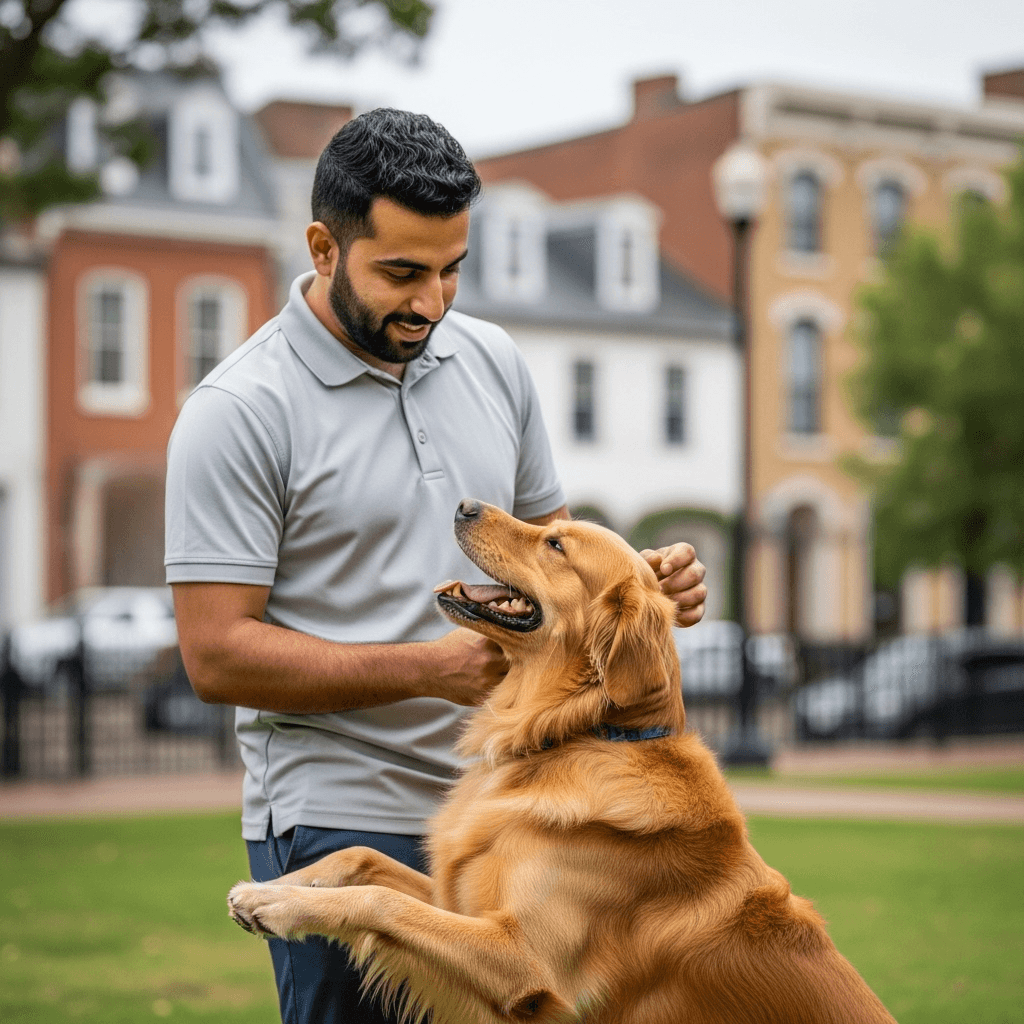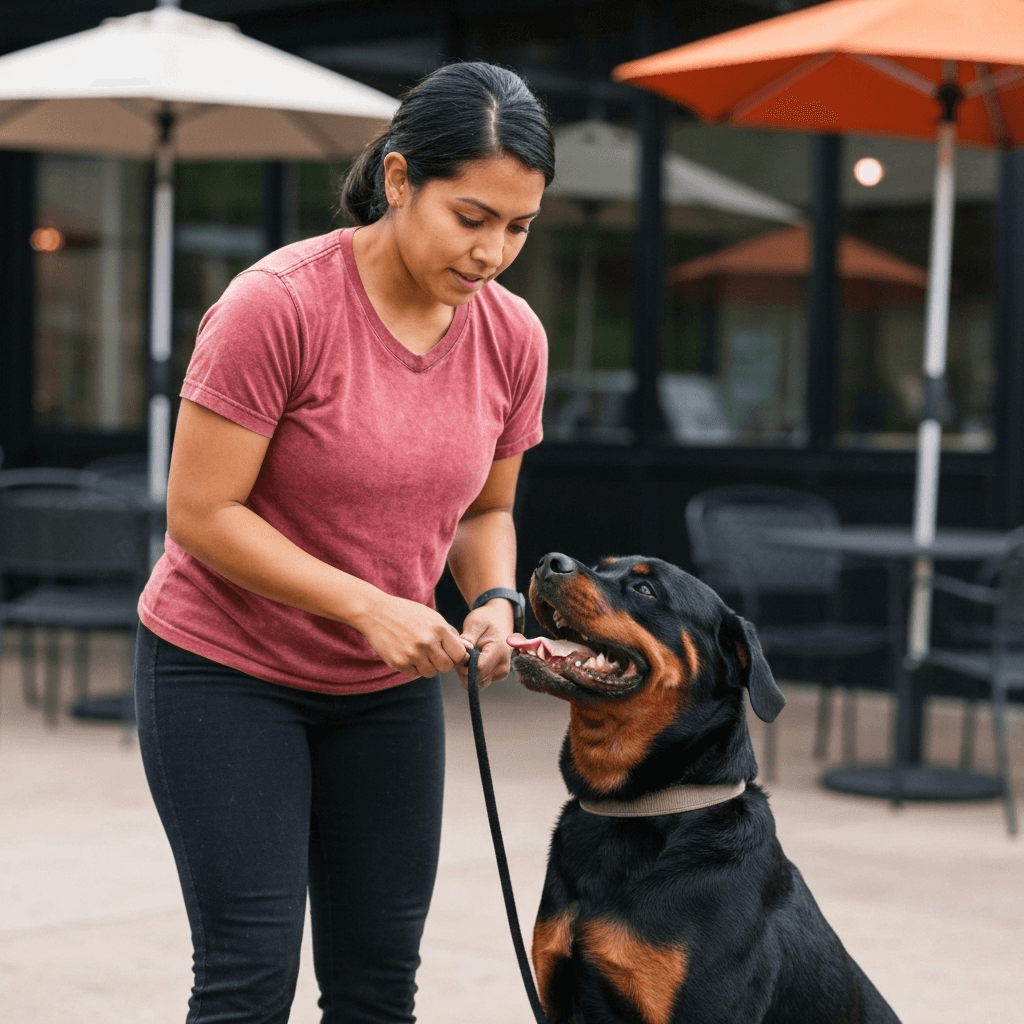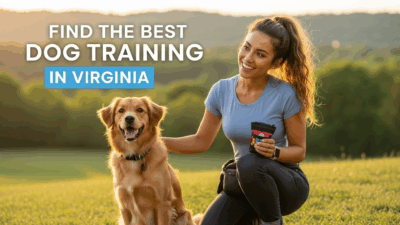Your Complete Guide to Choosing a Dog Trainer in Virginia
Virginia offers dog owners everything from bustling urban centers to quiet mountain trails, and your dog needs to handle all of it. Whether you’re navigating busy sidewalks in Northern Virginia, visiting Shenandoah’s hiking trails, or exploring coastal areas near Virginia Beach, training helps your dog stay focused and well-behaved.
The state’s mix of suburbs, cities, and rural communities means each area comes with unique challenges. A good trainer understands Virginia’s local ordinances, park rules, and public spaces where your dog will spend time.
How to Choose the Right Trainer
Look for someone who uses positive reinforcement training and can help you set realistic goals for your Virginia lifestyle. Your dog should learn to walk calmly through crowded areas, stay polite during visits to outdoor patios, and handle distractions like wildlife on trails.
Credentials help you compare trainers’ experience and education levels quickly. Common dog trainer certifications include KPA-CTP, CPDT-KA, or IAABC-CDBC for behavior problems. If your dog shows serious aggression or fear, look for someone with CBCC-KA or a science-based program like CTC.
In-home dog training sessions work great for puppy training, door manners, and neighborhood leash skills. Group classes make sense once your dog can focus around other dogs, especially before you try busy farmers markets or outdoor events.
Ask about the trainer’s experience with your specific challenges. If you’re working on reactivity toward other dogs, find someone who has successfully helped dogs practice calm behavior in real-world Virginia settings.
Common Dog Training Methods Explained

Reward-based methods build trust while creating lasting behavior changes. They also help you follow local ordinances about keeping dogs under control in public spaces across Virginia.
Basic obedience covers sit, down, stay, place, recall, and leash training so your dog can handle walks, restaurant patios, and park visits without pulling or jumping on people. These skills matter whether you’re in Richmond, Charlottesville, or smaller communities.
Puppy classes focus on socialization, potty training, bite control, crate comfort, and early leash skills. Starting with short, positive training sessions prevents bad habits from forming in the first place.
Behavior modification addresses fear, reactivity, resource guarding, or separation anxiety through careful desensitization and counterconditioning. For serious cases, ask if your trainer works with local veterinarians who understand behavior issues.
Private lessons and in-home sessions let you customize everything around your daily routines. Day training can speed up results when you’re short on time or need intensive help with specific problems.
Dog training classes help your dog practice good manners around other dogs and people. The best group classes give dogs plenty of space, screen participants carefully, and teach calm behavior rather than just excitement.
Specialized programs like therapy dog training or service dog training require extra structure, public-access skills, and a very clear step-by-step training program. These dogs need to handle Virginia’s varied environments with total reliability.
Stay away from trainers who use fear, intimidation, or pain to get results. Humane methods are safer for everyone, easier to maintain long-term, and much better for keeping peace with your neighbors across Virginia communities.
Average Cost of Dog Training in Virginia (Updated for 2025)
Prices across Virginia depend on the trainer’s experience, session length, and location. Urban areas like Northern Virginia typically run higher than rural regions, but quality dog training services are available statewide.
| Service Type | Average Cost (Virginia) |
|---|---|
| Puppy classes (4-6 weeks) | $140-$280 total |
| Group obedience classes (4-6 weeks) | $150-$300 total |
| Private lessons (60-90 min) | $100-$200 per session |
| In-home coaching packages (4-6 visits) | $400-$950 total |
| Day training (trainer works your dog) | $400-$1,000 per week |
| Behavior consult for reactivity/anxiety | $150-$275 |
| Board and train (2-4 weeks) | $2,000-$5,000 total |
Northern Virginia and Hampton Roads areas tend toward the higher end of these ranges. Rural areas and smaller towns often offer more affordable options while still providing excellent dog obedience training.
Make sure you understand what’s included in the price, how the professional dog trainer tracks progress, and whether they offer a free consultation before you commit to a training program.
Questions to Ask a Potential Dog Trainer
- What training methods do you use, and how do you keep sessions positive and low-stress?
- What credentials do you have, like CPDT-KSA or KPA-CTP? Do you pursue continuing education?
- How will you customize the training plan for my dog’s specific needs and our Virginia lifestyle?
- Do you offer in-home visits, group classes, or day training, and which approach fits my goals best?
- How will we measure my dog’s progress and know when to add more distractions?
- What are the total costs, including any travel fees, and what’s your cancellation policy?
- Do you carry liability insurance, and can you show me proof?
- For behavior problems, will you work with my veterinarian if needed?
- What should I practice between our training sessions to help my dog keep improving?
- Have you worked with dogs facing similar challenges in Virginia settings?
Local Virginia Rules and Considerations
Virginia law requires all dogs to be licensed and vaccinated against rabies. Counties and cities enforce their own specific leash laws and nuisance ordinances, so check your local government website for details.
Most Virginia localities require leashes in public spaces, parks, and on trails unless you’re in a designated off-leash area. Keep a standard 6-foot leash with you for public areas.
The Virginia Department of Health oversees rabies vaccination requirements statewide. All dogs must receive their first rabies vaccine by 4 months of age, with boosters following your veterinarian’s schedule.
Excessive barking can be considered a nuisance under local ordinances throughout Virginia. Work with your dog trainer on alert barking and separation anxiety before neighbors file complaints.
Virginia doesn’t require specific licenses for expert dog trainers, but anyone operating a boarding facility needs to register with the Virginia Department of Agriculture and Consumer Services. If a trainer offers board and train services, verify their facility meets state standards.
Many Virginia parks require permits for commercial dog training sessions. Your trainer should handle these permits and carry liability insurance when working in public spaces.
Local Virginia Resources for Dog Owners
These locations give you great places to practice polite manners, work on recalls, and provide safe enrichment to help your dog become well-behaved. Always follow posted rules and etiquette guidelines.
- Shirlington Dog Park in Arlington offers separate areas for large and small dogs with agility equipment for advanced training practice.
- Barker Field in Charlottesville provides a fully fenced space where you can work on recall and focus around other dogs in a controlled setting.
- Red Wing Park Dog Park in Virginia Beach features multiple fenced areas near the beach, perfect for building confidence in dogs who need socialization work.
- Baron Cameron Dog Park in Reston includes wooded trails and open fields within the fenced area for varied training environments.
- Shenandoah National Park welcomes leashed dogs on many trails, giving you excellent opportunities to practice focus around wildlife, hikers, and families.

FAQs
How much does in-home dog training cost?
Most Virginia trainers charge $100-$200 per in-home visit, with packages offering better value. Behavior modification for issues like aggression or severe anxiety typically starts at the higher end.
Is in-home dog training worth it?
Absolutely, because you’re working on problems exactly where they happen. Your trainer can address door manners, jumping on guests, counter-surfing, and yard reactivity right at home, then step outside to practice leash skills on your actual neighborhood sidewalks.
Can you pay someone to house train your dog?
Yes, many trainers offer puppy programs that include potty training, crate routines, and daily schedules. Day training can speed up the process while teaching you how to maintain the progress at home.
What is the 3-3-3 rule for dog training?
This helpful timeline applies to new or adopted dogs: expect about 3 days for your dog to decompress, 3 weeks to learn your routines, and 3 months to feel completely settled. Good training plans work with this natural adjustment period rather than rushing results.
How long will it take to reach my training goals?
Most puppies and friendly adult dogs show solid progress within 4-8 weeks if you practice daily. Fear, reactivity, or aggressive dog training typically requires several months of careful behavior modification with gradual increases in difficulty.
What should I bring to group classes?
Pack a flat collar or harness, a 6-foot leash, high-value treats, water, and current vaccination records if your trainer requests them. Leave retractable leashes at home for safety reasons.
What’s the leash law in Virginia?
Leash laws vary by locality across Virginia. Most counties and cities require dogs to be leashed in public spaces, parks, and on trails unless you’re inside a designated off-leash dog park. Check your local ordinances for specific requirements.
Do I need a dog license in Virginia?
Yes, most Virginia localities require dog licenses. Requirements vary by county and city, but you’ll typically need proof of current rabies vaccination to obtain a license. Contact your local treasurer’s office or animal control for specific rules and fees.
What shots does my dog need in Virginia?
Rabies vaccination is required by Virginia state law for all dogs. Your veterinarian may also recommend distemper-parvo combination vaccines, bordetella, and others based on your dog’s lifestyle and exposure risks.
Are dog trainers required to be licensed in Virginia?
Virginia doesn’t require special licenses for dog trainers themselves. However, if a trainer operates a boarding facility for board and train programs, that facility must be registered with the Virginia Department of Agriculture and Consumer Services under the state’s animal care laws.
Where can I practice off-leash recall?
Use fenced dog parks throughout Virginia to keep things safe and legal. Many communities offer multiple options, and visiting during quieter hours helps when you’re starting recall training with a young or distracted dog.
Which dog parks allow training around Virginia?
Most Virginia dog parks welcome training practice within their fenced boundaries. Popular options include Shirlington Dog Park, Barker Field, Baron Cameron Dog Park, and Red Wing Park Dog Park. Always follow posted rules about commercial training if you’re working with a paid trainer.
What beaches or trails allow dogs for training?
First Landing State Park near Virginia Beach allows leashed dogs on trails. Shenandoah National Park welcomes leashed dogs on most trails, offering excellent training opportunities around wildlife and other hikers. Many Virginia State Parks have specific trails where leashed dogs are welcome, so check individual park rules before visiting.
How do I find a certified dog trainer in Virginia?
Look for trainers with credentials from recognized organizations. Ask about their specific certifications, continuing education, and experience with your type of training challenge. Many trainers offer a free evaluation where you can discuss their methods and background.
What if my dog is aggressive toward other dogs?
Seek help from a professional dog trainer with experience in behavior modification and reactivity. Look for someone with advanced credentials in behavior consulting who can create a careful desensitization plan. Keep your dog on leash in public, maintain distance from triggers, and avoid dog parks until you’ve made significant progress.
Can I train my dog at Virginia state parks?
Yes, leashed dogs are welcome at many Virginia State Parks on designated trails. These locations offer great real-world training opportunities with distractions like other hikers, cyclists, and wildlife. Always check specific park rules and keep your dog on a 6-foot leash.
The right combination of thoughtful planning, humane methods, and consistent practice will help your dog become a confident companion across Virginia’s diverse environments. Whether you choose training for dogs in busy urban areas or quiet rural settings, positive reinforcement training creates lasting results that make life better for both you and your top dog.
